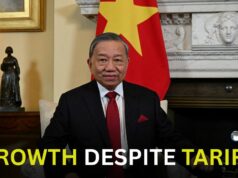Taiwan Premier Cho Jung-tai stated on Tuesday that the island’s 23 million residents will not “return” to China, following Chinese President Xi Jinping’s assertion of sovereignty during a call with U.S. President Donald Trump.
Xi told Trump on Monday that Taiwan’s “return to China” at the end of World War Two was a key part of Beijing’s vision for the world order. Taiwan’s democratically elected government strongly rejects China’s stance.
“We must once again emphasise that the Republic of China, Taiwan, is a fully sovereign and independent country,” Cho told reporters outside parliament, referring to the island’s formal name.
Taiwan Rejects China’s Autonomy Model
China has offered Taiwan a “one country, two systems” model, which enjoys no support from any mainstream Taiwanese political party and has been rejected by President Lai Ching-te.
Relations between Beijing and Tokyo have plunged after Japanese Prime Minister Sanae Takaichi said this month that a hypothetical Chinese attack on Taiwan could trigger a military response from Japan.
China says Taiwan is its most important and sensitive diplomatic issue.
Taipei has repeatedly denounced Beijing for trying to distort the legacy of World War Two, which ended 80 years ago, especially as Taiwan was handed to the Republic of China government at the end of the conflict.
Chinese Military Pressure
Beijing has never renounced the use of force to bring Taiwan under its control and has stepped up its military pressure against the island.
On Tuesday, Taiwan’s defence ministry said it had spotted a single balloon coming from China flying over the sensitive Taiwan Strait the day before.
Taiwan has complained that these balloon flights, which typically occur in the winter months, are part of a pattern of Chinese harassment activities.
China has previously dismissed Taiwan’s complaints about the balloons, saying they were for meteorological purposes and should not be hyped up for political reasons.
(With inputs from Reuters)




